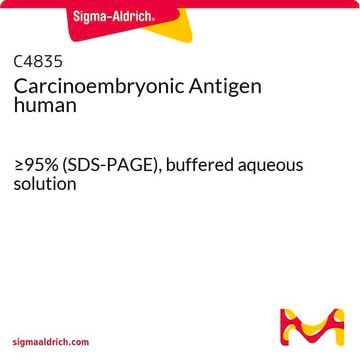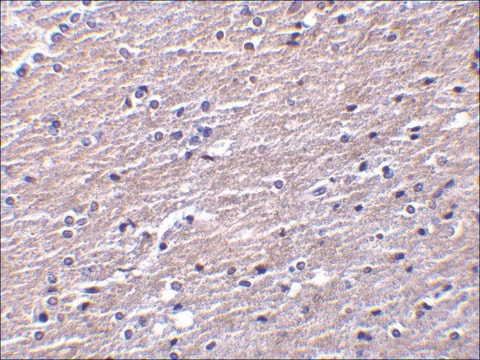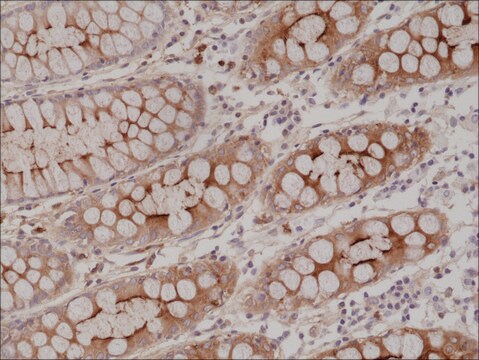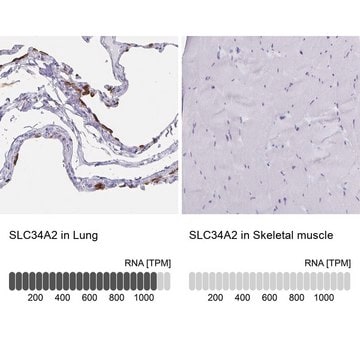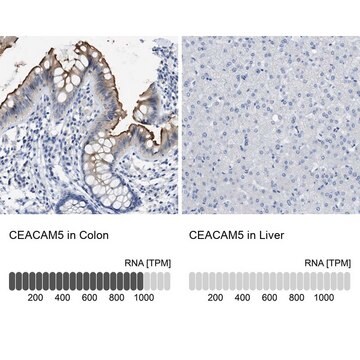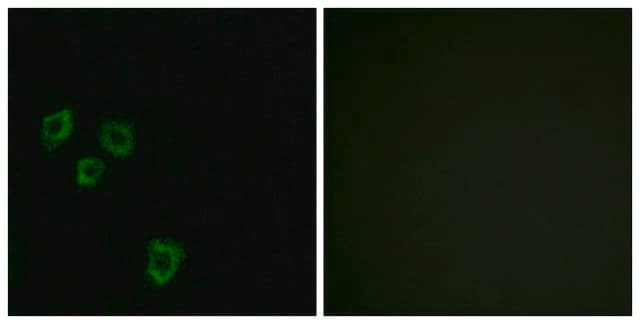추천 제품
생물학적 소스
mouse
Quality Level
결합
unconjugated
항체 형태
ascites fluid
항체 생산 유형
primary antibodies
클론
C6G9, monoclonal
포함
15 mM sodium azide
종 반응성
human
기술
flow cytometry: suitable
immunohistochemistry (formalin-fixed, paraffin-embedded sections): 1:8,000 using human colon carcinoma tissue
western blot: suitable
동형
IgG1
UniProt 수납 번호
배송 상태
dry ice
저장 온도
−20°C
타겟 번역 후 변형
unmodified
유전자 정보
human ... CEACAM5(1048)
일반 설명
Carcinoembryonic Antigen (CEA) is a member of the immunoglobulin superfamily that regulates cellular signaling and adhesion. CEA inhibits cell differentiation and subsequently facilitates tumor growth . Thus, CEA has been implicated in various cancers, including colorectal, lung and breast tumors
Monoclonal Anti-Human Carcinoembryonic Antigen (CEA) reacts specifically with human CEA (CD66e, 180 kDa) from different types of malignant tissues. The antibody detects an epitope which is resistant to 30 minute oxidation by 1% sodium periodate solution in formalin-fixed, paraffin-embedded tissue sections. Enzymatic predigestion with proteolytic enzymes enhances immunohistochemical staining with the antibody.The product reacts with medullary thyroid cancers and also associates with cell surface and cytoplasm of malignant glands in colorectal adenocarcinomas. Additionally, the product reacts weakly with normal colon mucosa and occasionally reacts with bile canalicular and pancreatic acinar cells. However, the antibody does not react with other tested tissue such as term placenta, nor does it bind to non-specific cross-reacting antigen (NCA) in granulocytes.
Monoclonal Anti-Human Carcinoembryonic Antigen (CEA) reacts specifically with human CEA (CD66e, 180 kDa) from different types of malignant tissues. The antibody detects an epitope which is resistant to 30 minute oxidation by 1% sodium periodate solution in formalin-fixed, paraffin-embedded tissue sections. Enzymatic predigestion with proteolytic enzymes enhances immunohistochemical staining with the antibody.The product reacts with medullary thyroid cancers and also associates with cell surface and cytoplasm of malignant glands in colorectal adenocarcinomas. Additionally, the product reacts weakly with normal colon mucosa and occasionally reacts with bile canalicular and pancreatic acinar cells. However, the antibody does not react with other tested tissue such as term placenta, nor does it bind to non-specific cross-reacting antigen (NCA) in granulocytes.
Carcinoembryonic Antigen (CEA) is located on human chromosome 19q13.2.
특이성
The antibody reacts specifically with human CEA (CD66e, 180 kDa) from several types of malignant tissue including colorectal, lung and breast tumors. It also stains medullary carcinomas of the thyroid. The product reacts strongly with the cell surface and cytoplasm of malignant glands in colorectal adenocarcinomas. A weak reactivity is seen with normal colon mucosa and occasionally with bile canalicular and pancreatic acinar cells, but not with other tested tissue including term placenta. There is no cross-reactivity with non-specific cross-reacting antigen (NCA) present in granulocytes, using immunoblotting, flow cytometry and immunohistochemical techniques. The antibody recognizes an epitope that is resistant to 30 minute oxidation by 1% sodium periodate solution in routine formalin-fixed and paraffin-embedded tissue sections. Enzymatic predigestion with proteolytic enzymes improves immunohistochemical staining with the antibody.
면역원
carcinoembryonic antigen (CEA) isolated from a human colon adenocarcinoma cell line.
애플리케이션
Monoclonal Anti-Carcinoembryonic Antigen antibody is suitable for use in immunohistochemistry (1:8,000 using formalin-fixed, paraffin-embedded sections of human colon carcinoma tissue).
Monoclonal Anti-Carcinoembryonic Antigen antibody produced in mouse has been used in western blot analysis and surface plasmon resonance (SPR) based immunoassay.
생화학적/생리학적 작용
Carcinoembryonic Antigen (CEA) inhibits tumor growth in colon, hepatoma and prostate cancers.
면책조항
Unless otherwise stated in our catalog or other company documentation accompanying the product(s), our products are intended for research use only and are not to be used for any other purpose, which includes but is not limited to, unauthorized commercial uses, in vitro diagnostic uses, ex vivo or in vivo therapeutic uses or any type of consumption or application to humans or animals.
적합한 제품을 찾을 수 없으신가요?
당사의 제품 선택기 도구.을(를) 시도해 보세요.
Storage Class Code
10 - Combustible liquids
WGK
nwg
Flash Point (°F)
Not applicable
Flash Point (°C)
Not applicable
시험 성적서(COA)
제품의 로트/배치 번호를 입력하여 시험 성적서(COA)을 검색하십시오. 로트 및 배치 번호는 제품 라벨에 있는 ‘로트’ 또는 ‘배치’라는 용어 뒤에서 찾을 수 있습니다.
Characterizing the Tumor Suppressor Role of CEACAM1 in Multiple Myeloma
Xu J, et al.
Cellular Physiology and Biochemistry, 45(4), 1631-1640 (2018)
Virna Cortez-Retamozo et al.
Cancer research, 64(8), 2853-2857 (2004-04-17)
Nanobodies are the smallest fragments of naturally occurring single-domain antibodies that have evolved to be fully functional in the absence of a light chain. Nanobodies are strictly monomeric, very stable, and highly soluble entities. We identified a nanobody with subnanomolar
The role of the carcinoembryonic antigen receptor in colorectal cancer progression
Bajenova O, et al.
Journal of integrative oncology., 6(2), 192-192 (2017)
A genetic linkage map of the mouse: current applications and future prospects.
Copeland NG
Science, 262(5130), 57-66 (1993)
Marta Compte et al.
Oncoimmunology, 3, e28810-e28810 (2014-07-25)
Gene therapy to achieve in vivo secretion of recombinant anti-CD3 x anti-tumor bispecific antibodies in cancer patients is being explored as a strategy to counterbalance rapid renal elimination, thereby sustaining levels of bispecific antibodies in the therapeutic range. Here, we
자사의 과학자팀은 생명 과학, 재료 과학, 화학 합성, 크로마토그래피, 분석 및 기타 많은 영역을 포함한 모든 과학 분야에 경험이 있습니다..
고객지원팀으로 연락바랍니다.